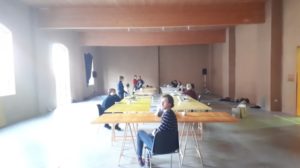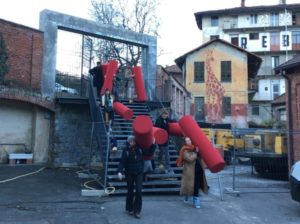Awareness, responsibility, autonomy: these are some of the key points on which the ‘Cittadellarte & ArtEZ Residence Programme’ is centred, a residency programme for 4th year students of the course of Visual Arts of Arnhem Art Academy. The project, involving twelve students from 20 to 28 years old, represents both an opportunity for personal growth (they are all at their first artistic residency and ten of them are in their last year of the bachelor’s in visual arts) and an extraordinary educational instrument.
A project lasting over a month, in which the students organize their time and work in autonomy, experimenting with self-management and the responsibility of artistic research. Specifically, each resident has at their disposal an individual space in which to develop their personal work, but there will be moments of collective debate and dialogue between participants, tutors and UNIDEE staff, and also of interaction with other projects: the artist Nico Angiuli, for example, is currently working at Cittadellarte: the shooting of his film ‘The Human Tools’ is drawing to an end. The students’ ‘headquarters’ are in Sala Cervo, set up like studios and working space, but they will have access to other key areas of the Fondazione, like the library, the UNIDEE spaces and the woodworking workshop.
What’s behind the scenes of the organization of the residency? On one side is Cittadellarte’s project to establish an academy focusing on social transformation; on the other, the relationship between Fondazione Pistoletto and ArtEZ, and in particular BEAR, the most innovative bachelor’s course in visual arts in The Netherlands. Cittadellarte has been collaborating with ArtEZ for over a year: the objective is not only to develop common educational projects like the one in progress or the one held last September/October (in which about twenty students worked on the theme of socially engaged art), but also to build an actual shared international bachelor’s course.
Michele Cerruti But (coordinator of the project and of Cittadellarte’s programme of High Education) has talked to us about the contents and the programme of the residency: “Even if in the course of these weeks students will be experimenting with autonomy, they are not going to be alone: Sala Cervo has in fact been designated as a collective space where they will all be operating together, facilitating a mutual assimilation”. How do you combine autonomy and self-management of research with a collective collaboration? “There are no plans of specific group projects, – explains Cerruti But – but sharing the same space will allow them to interact with each other on a daily basis. The set up of the studios is in this sense revealing: we have given them the opportunity to arrange tables and chairs the way they preferred, creating a situation in which they had to negotiate among themselves. The interesting thing is that without being suggested it, they all composed a single big table, rather than each creating their own little corner. It’ll be nice to see how the space will change throughout the residency, but this shows that sharing the same space is in itself a way to experiment with the relationship between autonomy and group.


The programme – continues the coordinator of the project – will include weekly meetings managed by the UNIDEE office, in the persons of Juan Sandoval, Annalisa Zegna, Clara Tosetti and myself. These are opportunities to deal with the technical aspects of the residency, but also to raise issues of responsibility. Besides, the students are invited to travel during their stay (to Milan, Turin, the Biellese area or anywhere else) and every day they can talk to the person assisting them (even in informal chats about their researches). In addition, every week there will be a tutor from ArtEZ meeting the students both individually and collectively, accompanying them along the process. The end of the experience will be marked by an open studio attended, by invitation, by artists, curators and academics with whom the students will be able to discuss about their works.”
The residency at Cittadellarte will also allow the participants in their last year of the bachelor’s to concentrate on the exam they will have to take as part of their course of studies (a pre-exam in February and the final at the beginning of the summer). “These weeks spent working at Cittadellarte – explains Cerruti But – will be of fundamental importance to them. Their last year focuses on individual research and it’s interesting to see it being carried out here. Five weeks in the spaces of Fondazione Pistoletto can turn out to be a sort of intellectual and spiritual retreat for them to delve into their research, an actual immersion in a stimulating school helping them concentrate.”

